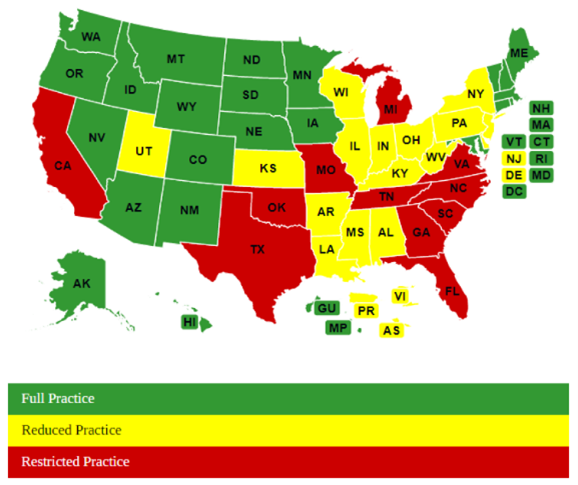Pressure Building on NCGA to Pass the SAVE Act
For Immediate Release
May 17, 2021
RALEIGH - With the North Carolina General Assembly’s crossover deadline come and gone, supporters of the SAVE Act (SB 249/HB 277) are calling on legislators to renew focus on this popular, bipartisan bill that would increase access to healthcare. The bill was not subject to crossover, meaning it can be heard – and passed – at any time through the adjournment of the 2021-2022 biennium.
Momentum for the SAVE Act continues to build. In the last several weeks alone, three new major endorsers have made the business case for passage of this legislation. Meanwhile, the National Academy of Medicine has, once again, said the bill’s goals should be a major part of the country’s healthcare strategy with its new Future of Nursing 2020-2030 report.
“At least 102 legislators are already lined up behind this bill. They’re not simply supporting it, but actually sponsored it,” said Tina Gordon, CEO of the North Carolina Nurses Association (NCNA). “The groups outside of nursing that have endorsed it span the spectrum. Only organized medicine is opposing the legislation, and their intransigence is preventing North Carolinians from better access to affordable, quality healthcare. It is long past time to break this ridiculous stalemate.”
April 28: NCNA announces the Convenient Care Association (CCA) is endorsing the SAVE Act.
.png)
CCA is a trade organization for companies like Walgreens, CVS MinuteClinic, Kroger Health, and Walmart Care Clinic, that provide consumers with accessible, affordable, quality healthcare in retail-based locations. “Passing legislation removing barriers would increase the ability for more clinics to open in North Carolina, impacting both health and economic outcomes in the state,” said Nate Bronstein, Chief Operating Officer of the Convenient Care Association.
May 13: NCNA announces Amazon is endorsing the SAVE Act.
.png)
Amazon sees benefits of Full Practice Authority for APRNs for both its 27,000 employees in North Carolina and the 2 million North Carolinians living in primary care shortage areas. “In 2025, one in five North Carolinians will be 65 or older. The SAVE Act will help improve access to care for this group of people and others,” said Maria Saab, Manager, Amazon Web Services Public Policy.
May 14: NCNA announces the Alliance for Connected Care (ACC) is endorsing the SAVE Act.
.png)
This organization promotes safe, high quality care via telehealth. Its board members include Johns Hopkins Medicine, CVS Health, Amazon, and Walmart, among others. “We are writing to express our support for The SAVE Act … The Alliance believes APRNs should be able to perform at the top of their license in order to expand access and eliminate barriers to health care,” said Krista Drobac, Executive Director of the Alliance for Connected Care.
These three new additions to the coalition of support represent the 15th, 16th, and 17th organizations to endorse the SAVE Act this session. Notably, they each represent influential voices from the business community. The three newcomers join longtime supporters such as AARP North Carolina, Americans for Prosperity North Carolina, the NC Rural Center, and others. Click here to see the current list of coalition members.
Additionally, just last week the National Academy of Medicine released its major report, The Future of Nursing 2020-2030: Charting a Path to Achieve Health Equity. The report cited North Carolina as one of the 11 most restrictive states in the country for Advanced Practice Registered Nurses (APRNs), before going on to say: “Until all APRNs are permitted to practice to the full extent of their education and training, significant and preventable gaps in access to care will continue. Millions of people who need health care will be unable to obtain needed care as readily as others who happen to live in states where NPs’ scope of practice is not restricted.”

As the name of the report indicates, a major focus of the Future of Nursing’s recommendations is health equity. The National Academy of Medicine went out of its way to highlight modernizing APRN regulations as a way of improving health outcomes for some of the country’s most at-risk populations.
Taken together, the news from the last few weeks shows that North Carolina’s inaction on this legislation puts the General Assembly at odds with patient groups, business interests, and evidence-based recommendations from healthcare experts. Research specific to North Carolina shows the SAVE Act could reduce healthcare costs by more than $400 million per year and create at least 3,800 jobs per year, while increasing access to safe, quality care.
NCNA and its allies ask Sen. Phil Berger, Rep. Tim Moore, and the chairs of relevant committees to allow this legislation to move forward so legislators can bring home a well-deserved healthcare win for their constituents.
MEDIA CONTACT
Chris Cowperthwaite, APR
Director of Communications & Outreach
(919) 821-4250 or chriscowperthwaite@ncnurses.org
ABOUT NCNA
As the leading professional organization for North Carolina’s registered nurses, we equip nurses at all stages to thrive in an ever-changing healthcare environment. NCNA helps keep North Carolina nurses on the cutting edge of nursing practice, policy, education, and more. Join us as we work to advance nursing and ensure high-quality healthcare for everyone.
Established in 1902, NCNA provides continuing education, networking and legislative advocacy for registered nurses throughout North Carolina.
MISSION STATEMENT
The North Carolina Nurses Association serves the changing needs of its members, addresses nursing issues, and advocates for the health and well-being of all people.